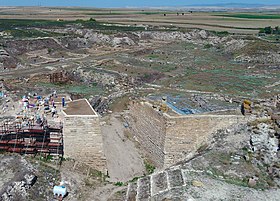
Back غورديوم Arabic Qordion AZ Гордзіян BE Гордион Bulgarian Gòrdion Catalan Gordion Czech Gordion German Γόρδιον Greek Gordio EO Gordio Spanish
Γόρδιον Gordiyon | |
 The Early Phrygian East Citadel Gate at Gordion, with the Terrace Building Complex and Megaron buildings behind it | |
| Location | Yassıhüyük, Ankara Province, Turkey |
|---|---|
| Region | Phrygia |
| Coordinates | 39°39′01″N 31°58′42″E / 39.650356°N 31.978243°E |
| Type | Settlement |
| Site notes | |
| Website | www |
| Official name | Gordion |
| Type | Cultural |
| Criteria | (iii) |
| Designated | 2023 (45th session) |
| Reference no. | 1669 |
| UNESCO Region | Europe and North America |

Gordion (Phrygian: Gordum;[1] Greek: Γόρδιον, romanized: Górdion; Turkish: Gordion or Gordiyon; Latin: Gordium) was the capital city of ancient Phrygia. It was located at the site of modern Yassıhüyük, about 70–80 km (43–50 mi) southwest of Ankara (capital of Turkey), in the immediate vicinity of Polatlı district. Gordion's location at the confluence of the Sakarya and Porsuk rivers gave it a strategic location with control over fertile land. Gordion lies where the ancient road between Lydia and Assyria/Babylonia crossed the Sangarius river. Occupation at the site is attested from the Early Bronze Age (c. 2300 BCE) continuously until the 4th century CE and again in the 13th and 14th centuries CE.[2] The Citadel Mound at Gordion is approximately 13.5 hectares in size, and at its height habitation extended beyond this in an area approximately 100 hectares in size. Gordion is the type site of Phrygian civilization, and its well-preserved destruction level of c. 800 BCE is a chronological linchpin in the region. The long tradition of tumuli at the site is an important record of elite monumentality and burial practice during the Iron Age.
In 2023, Gordion was listed as UNESCO World Heritage Site.[3]
- ^ Adams, Douglas Q. (1997). Mallory, J.P.; Mallory, Douglas Q. (eds.). Encyclopedia of Indo-European Culture. Taylor & Francis. p. 199. ISBN 978-1-884-96498-5.
- ^ Rose, C. Brian (2017). "Fieldwork at Phrygian Gordion, 2013-2015". American Journal of Archaeology. 121 (1): 135–178. doi:10.3764/aja.121.1.0135. JSTOR 10.3764/aja.121.1.0135.
- ^ "Gordion". UNESCO World Heritage Centre. Archived from the original on 2023-09-18. Retrieved 2023-09-18.
